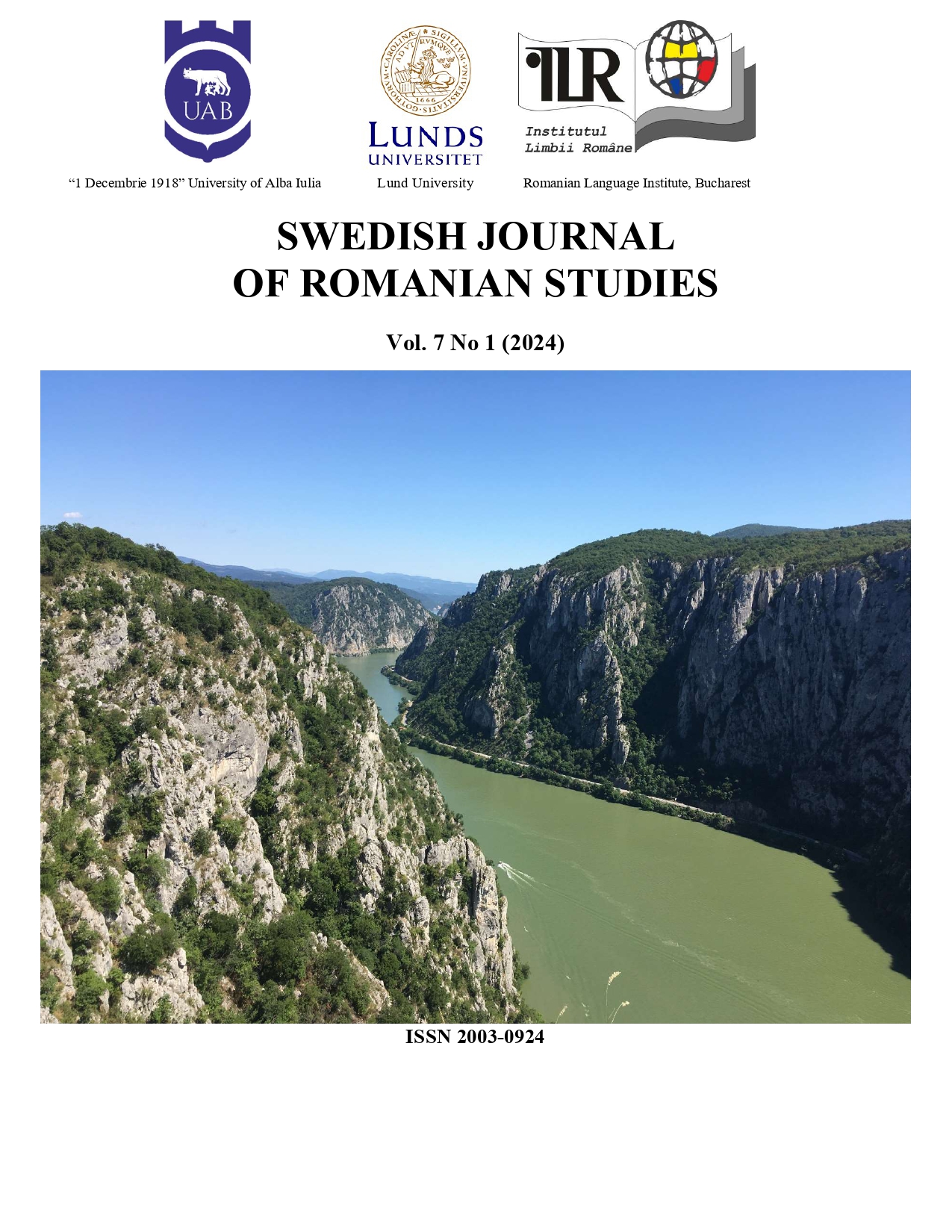Why politicize the cultural game? (Emil) Cioran’s ethos: mysticism, religion and ethnic philosophy
DOI:
https://doi.org/10.35824/sjrs.v7i1.26119Keywords:
Emil Cioran, mysticism, left-wing, right-wing, hermeneuticsAbstract
The present research aims at understanding some of Emil Cioran's spiritual positions in several of his writings. The tools of analysis are the philosophical and cultural approaches, but also elements of positivist determinism, such as climate, disease, etc. The oeuvres studied belong to different periods of creation. The working hypothesis is that the essayist remained a lifelong thinker oscillating between the extreme right and the extreme left, as well as a stubborn and metaphysically rejected progressive thinker, but always obsessed with metaphysics and the transcendent. Among the commonplaces of Cioran's artistic and geopolitical critique of reality and the real are narcissism, humor, victimhood and diatribe. His work is underpinned by intuition and Utopian projection and much less by logic. Cioran becomes dangerous if treated as a programmatic philosopher, but otherwise he is a spectacular source of artistic and literary-philosophical insights; an experimental essayist, dangerous as an influencer. The fate of his thinking has been heavily marked by the ideologies of his interpreters.
References
Álvarez Lopeztello, J. L. (2022). Emil Cioran, un diletante de servicio en un mundo agonizante [Emil Cioran, an on-duty dilettante in a dying world]. Revista digital FILHA, Enero-julio (26), 1-26. Publicación semestral. Zacatecas: Universidad Autónoma de Zacatecas. Disponible en: http://www.filha.com.mx. ISSN: 2594-0449.
Bolea, Ș. (2019). Antihumanism in the works of E.M. Cioran and Thomas Bernhard. Philobiblon: Transylvanian Journal of Multidisciplinary Research in Humanities, 24(1), 79-89. DOI: 10.26424/philobib.2019.24.1.04
Bradatan, C. (2016, November 28). The philosopher of failure: Emil Cioran’s heights of despair. Los Angeles Review of Books. Retrieved from: https://lareviewofbooks.org/article/philosopher-failure-emil-ciorans-heights-despair/
Cioran, E. (1966). Cuaderno de Talamanca: Ibiza, 31 de julio – 25 de agosto de 1966 [Notebook from Talamanca: Ibiza, July 31 - August 25] (M. Arranz, Trad.). Valencia: Editorial Pre-texto.
Cioran, E. (2012). Anathemas and admirations (R. Howard, Trans.). New York: Arcade Publishing, Inc.
Cioran, E. (1990). Revelațiile durerii [The Revelations of pain]. Cluj-Napoca: Editura Echinox. Prefață de Dan C. Mihăilescu.
Cioran, E. (1995). Tears and saints (I. Zarifopol-Johnston, Trans.). Chicago: The University of Chicago Press.
Cioran, E. (2009). Transfiguration de la Roumanie [Transfiguration of Romania] (A. Paruit, Trans.). Paris, Éditions de L’Herne.
Cioran, E. M., & Brown, F. (Spring, 1968). The New Gods. The Hudson Review, 21(1), 39-52. DOI: https://doi.org/10.2307/3849511
Durán Giménez-Ríco, I. (1993). ¿Qué es la autobiografía? Respuestas de la crítica europea y americana [What Is autobiography? Answers from the European and American Cciticism]. Estudios Ingleses de la Universidad Complutense, 1, 69-82. Madrid: Edis. Complutense.
Garoiu, M. (2021). La poétique du fragment dans l’œuvre de Cioran [The poetics of fragment in Cioran’s work]. AYLLU-SIAF, 3(2), 23-38, ISSN: 2695-5938 e-ISSN: 2695-5946. DOI: 10.52016/Ayllu-Siaf. 2021.3.2.1
Horan, D. P. (2014). Beyond essentialism and complementarity: Toward a theological anthropology rooted in haecceitas. Theological Studies, 75(1) 94–117.
Maier, R. (2014). Salvation in Buddhism. Journal of Adventist Mission Studies, 10(1), 9-42. DOI: https://dx.doi.org/10.32597/jams/vol10/iss1/3/
Nica, M. (2016). The irony and obsessions of Cioran’s philosophy. Multicultural Representations: Literature and Discourse as Forms of Dialogue, 118-124. Retrieved from: https://portalcioranbr.wordpress.com/2018/10/20/irony-obsessions/
Sereș, A. (2009, January/February). Cioran pe masa de disecţie [Cioran on the dissection table]. Familia, (1-2), pp. 99-101. Retrieved from: https://www.romanian-philosophy.ro/newsletter-archive/pages/09_04_aprilie/[recenzie]Seres_Familia.pdf
Tulbure, C. N. (2015). De Emil Cioran a Cioran, análisis de un discurso político [From Emil Cioran to Cioran, analysis of a political speech]. Barcelona: Universitat de Barcelona. [Unpublished Doctoral Thesis].
Downloads
Published
How to Cite
Issue
Section
License
Copyright (c) 2024 Felix Nicolau

This work is licensed under a Creative Commons Attribution-NonCommercial 4.0 International License.
Authors who publish with this journal agree to the following terms:
a. Authors retain copyright and grant the journal right of first publication with the work simultaneously licensed under a Creative Commons Attribution-NonCommercial 4.0 International License that allows others to share the work with an acknowledgement of the work's authorship and initial publication in this journal.
b. Authors are able to enter into separate, additional contractual arrangements for the non-exclusive distribution of the journal's published version of the work (e.g., post it to an institutional repository or publish it in a book), with an acknowledgement of its initial publication in this journal.
c. Authors are permitted and encouraged to post their work online (e.g., in institutional repositories or on their website) prior to and during the submission process, as it can lead to productive exchanges, as well as earlier and greater citation of published work (See The Effect of Open Access).

